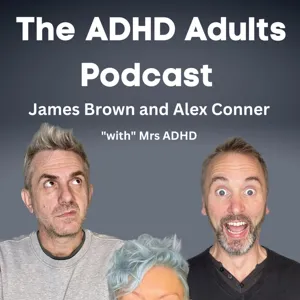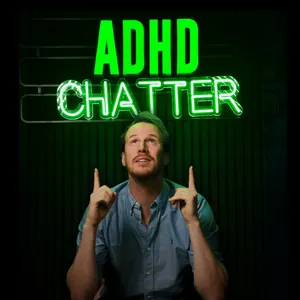Podcast Summary
Finding Connection and Understanding through Shared Experiences: The podcast offers validation, a sense of community, and valuable insights for individuals with ADHD, helping them feel less alone and understood.
The podcast, despite its light-hearted and sometimes humorous tone, provides a meaningful connection for listeners who may be struggling with complex feelings or challenges related to ADHD. James's openness about his own experiences and struggles resonates deeply with listeners, offering validation and a sense of community. The listener from Kidderminster shared how the podcast helped her understand and accept her own complicated feelings about sexuality and ADHD. The podcast also provides valuable information and insights, such as the surprising fact about Melbourne's penguins. Overall, the podcast creates a space where people with ADHD can feel understood, validated, and less alone.
Brain Development from Prenatal to Adulthood: The human brain undergoes significant development from prenatal stages to early adulthood, and recent discoveries suggest that neuronal plasticity allows for continued development even in adulthood. ADHD symptoms may be linked to differences in brain development, but ongoing brain changes offer potential for support and growth.
The human brain undergoes significant development from before birth until early adulthood, and this development is crucial for various aspects of our cognitive and emotional growth. The brain goes through key stages, including prenatal development, postnatal growth, and adolescence. The diagnosis of ADHD typically requires symptoms to be present by a certain age, suggesting that changes in brain development may have already occurred. However, recent discoveries about neuronal plasticity, or the brain's ability to change throughout life, have challenged the belief that the brain is fully developed by adulthood. This means that even in adulthood, the brain continues to develop, and people with ADHD may experience slower development in certain areas. Understanding these stages of brain development and the concept of neuronal plasticity can provide valuable insights into the nature of ADHD and potential ways to support individuals with this condition.
The adult brain can create new neurons and form new connections through neuroplasticity: Neuroplasticity offers hope for repairing damaged brain regions and enhancing brain function in conditions like ADHD, leading to improved symptoms and long-term positive changes.
The adult brain is more malleable than once believed, with the ability to create new neurons and form new connections through a process called neuroplasticity. This discovery has significant implications, offering hope for repairing damaged or poorly connected brain regions and enhancing brain function in various conditions, including ADHD. Neuroplastic changes can lead to improved symptoms and functioning, and even long-term positive changes. It's essential to remember that these differences in brain structure and function are not a sign of something being wrong but rather an opportunity for growth and better outcomes in life. Neuroimaging techniques, like brain scans, have shown that stimulant medication treatment for ADHD might be enhancing neural connections and communication between neurons, contributing to improved symptoms and potentially long-term positive changes in brain neuroplasticity. For children with ADHD, stimulant medication might be rewiring the brain to look and work more like a non-ADHD brain. These changes can last even after stopping medication.
Medication use in childhood for ADHD can lead to brain changes: Medication use during childhood for ADHD may improve symptoms and normalize brain areas, but long-term impact and sustained effects need further study
Consistent use of stimulant medication during childhood for ADHD can lead to lasting changes in brain structure and function, potentially improving symptoms and normalizing relevant brain areas compared to non-medicated adults with ADHD. However, more research is needed to understand the long-term impact of medication on neuroplasticity and whether these changes are sustained without continued treatment. It's essential to consider both the day-to-day symptom management and the potential long-term benefits when making the decision to medicate children or adults with ADHD.
Understanding Medication Discontinuation for ADHD: Only 12.5% of people with ADHD continue taking their meds long-term due to forgetfulness, improved symptoms, worsening side effects, or decreased effectiveness. Research and personal monitoring are crucial to assess changes and avoid misleading apps.
Long-term adherence to ADHD medication is a challenge, with only about 12.5% of people continuing to take their meds after five years. Reasons for this include forgetfulness, improved symptoms due to brain rewiring, worsening side effects, or decreased effectiveness. It's essential to understand the reasons behind medication discontinuation and the potential impact on individuals' brains. Research is needed to clarify the situation, and individuals should monitor their symptoms over time to assess any changes. Additionally, be cautious of misleading brain training apps and focus on effective coping strategies. Sam shared her concerns about the possibility of meds permanently altering her brain but felt neutral about it. She also noted that hormonal changes can significantly impact brain function and neuroplasticity.
Living with Autism and ADHD: Navigating Brain Development and Medication: Living with both autism and ADHD can impact brain development and medication use. Focus on strengths, consider neuroplasticity, and make informed decisions about medication based on personal goals.
Living with both autism and ADHD presents unique challenges for brain development and the use of medication. The speaker shares their personal experience of struggling to gauge how their brain has changed due to various factors, including their autism and ADHD. They mention the potential for neuroplasticity and the impact of stimulant medication on both conditions. The speaker emphasizes the importance of a positive perspective and focusing on strengths rather than catastrophizing behaviors. They also caution against relying on information found on the internet regarding neuroplasticity and brain development. Ultimately, the decision to take medication is a personal one, and the speaker encourages focusing on what one wants to accomplish rather than how they want to be perceived.
Hacking neuroplasticity through enjoyable activities: Engaging in activities we enjoy and are good at can positively impact brain development. Be mindful and intentional, especially with repetitive tasks, and find what helps us focus, such as music at 140 bpm.
Engaging in activities that you enjoy and are good at, even if you have ADHD, can contribute positively to your brain development. This is a form of "hacking neuroplasticity" that doesn't require any payment. However, repetitive reminders are necessary to help remember this. In the discussion, James shared an example of forgetting to remove an old credit card as the primary card for Apple Pay, which led to a charge. This incident highlights the importance of being mindful and intentional, especially with repetitive tasks. Another takeaway is that some people, like James, can focus well with music playing in the background, specifically at a beat per minute of 140. This can help drown out distractions and motivate them to complete tasks. Overall, the conversation emphasizes the importance of being aware of our habits and finding what works best for us to optimize brain function.
Listening to emotional music boosts dopamine levels and motivation for individuals with ADHD: Emotional music can increase dopamine and motivate individuals with ADHD, potentially improving focus and productivity
Listening to music, particularly the kind that evokes an emotional connection, can help increase dopamine levels and provide motivation, especially for individuals with ADHD. This can be a simple and effective strategy for improving focus and productivity. The specific tempo or BPM (beats per minute) of the music may not be as crucial as the emotional connection to the music. Some studies suggest that music can be beneficial for individuals with ADHD in a classroom setting, but more research is needed. The use of binaural beats is not currently scientifically proven to be effective, but some people find it helpful. If you're looking for motivation or a productivity boost, consider creating a personalized music playlist to help you get started on your day or during transitions between tasks.
ADHD Diagnosis Requires Childhood Symptoms: Adult ADHD diagnosis requires childhood symptoms with significant impact, and there are different diagnostic approaches globally. Hyperfocus and hyperfixation are intense focus on a topic, and the misconception of growing out of childhood symptoms is inaccurate.
The diagnosis of ADHD for an adult cannot be made if they did not exhibit significant symptoms as a child. The symptoms must have had a moderate impact on at least two areas of life, and there are different diagnostic approaches worldwide. Hyperfocus and hyperfixation are essentially the same thing, referring to intense focus on a particular topic for a short period of time. The misconception that one can go from being a child with a few symptoms but not the disorder to an adult with ADHD is not accurate according to diagnostic criteria. Additionally, some individuals with ADHD may have difficulty describing or rating pain due to their condition. This is a common issue, but not exclusive to ADHDers. Pain perception can be subjective and personal, and it may not always correlate with the intensity of the pain experienced.
Using pain as a focus tool in ADHD: People with ADHD may use pain as a coping mechanism to concentrate, but it's essential to remember they're not intentionally causing harm.
People with ADHD often use physical pain as a focus tool due to their unique brain wiring. This coping mechanism, while not recommended for everyone, helps them ground themselves and concentrate. However, it's essential to remember that individuals with ADHD still try to alleviate their pain and are not intentionally causing harm. This discussion also touched upon the challenges some individuals, such as alexithymics and those with hip pain, face when describing their symptoms. The conversation ended on a somber note, discussing neuroplasticity and the potential for brain change. While the episode explored some heavy topics, it's important to remember that understanding these challenges is crucial for creating a supportive environment for those living with ADHD.






